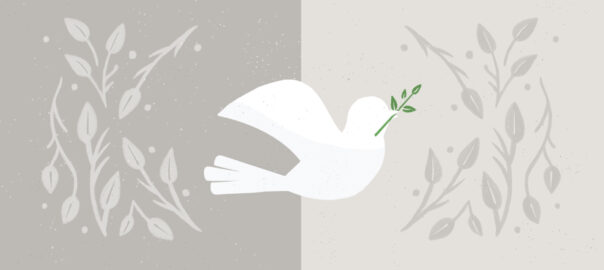
About 1,960 years ago, The Gospel of Matthew was penned, offering collections of the words and works of Jesus of Nazareth. Central to all the teachings presented are the Beatitudes found in Chapter 5. They constitute foundational dispositions and disciplines for followers of Jesus the Christ. One of these pithy and profound sayings is found in Matthew 5:9: “Blessed are the peacemakers, for they shall be called the children of God.” The “blessed” (happy, to be congratulated, under divine favor) actively pursue peace (concord, harmony, end of conflict, enemies becoming friends).
This peacemaking includes personal conflicts, peace among contentious groups, warring nations, and rival powers. Jesus was building on the Wisdom traditions of Israel calling the faithful to, “seek peace and pursue it.” (Psalm 34:14) and the Apostle Paul would highlight both the individual and relational facets of peace with God and among humankind (Romans 5:1; Galatians 5:22; Colossians 3:16). Jesus’s words have inspired intercultural and interracial harmony, as well as reconciliation movements throughout history. The Rev. Dr. Martin Luther King, Jr. in the 1950s and 1960s, and President Nelson Mandela in the 1990s are examples of peacemakers bringing justice and calm to intense struggles.
In our contentious public square, peacemaking is needed more than ever. The agitation propaganda, apocalyptic hyperbole, outright anger, and egregious personal insults are not fostering concord and harmony! Why is it so hard for people of conscience to ignore the reactive emotionalism and forge principled compromises and offer proximate justice? The answers are complex, but we can unearth the unspoken absolutes that create the conditions of contention. Underneath all the “be a good person” and “we ae all one” and “be kind” sayings are pillars of post-modern anarchy and subjectivism that make consensus hard. Here are a few of these new “absolutes”
- Knowledge is not objective, but subjective. Pursuing the truth of a matter is now replaced by “my truth.” Even the words, “fact(s)” and “objectivity” are considered oppressive and racist.
- The human person is now a malleable creation of the autonomous self, not an identity to cultivate and refine as a human being who is male or female. Gender anarchy is a deliberate subversion of the divine image and everyone is now their own god, manufacturing new narratives of victimhood and pseudo-liberation. Of course, anyone affirming the commonsense view that all humankind is one race (with many ethnicities, of course) with binary female and male characteristics is ignorant at best and evil at worst.
These crises of knowledge (epistemology) and human identity (anthropology) make peacemaking quite challenging. Part of peaceful relations is living civilly with our deepest differences, desiring for all freedom of conscience and opportunity to flourish. But the purveyors of the aforementioned axioms purposefully cultivate conflict so they can rage against the machine forever, instead of offering principles and pathways for a preferred future. There are two more unspoken absolutes that govern this grievance culture:
- Morality is subjective and traditional religions are the enemy of human freedom. Marxist ideology aims for a “new person” free from economic and spiritual history with the state in control of every detail of life. One set of absolutes is now replaced with “liberation” through class struggle…and history tells us this is disastrous!
- History must be shaped to promote political agendas, regardless of the tapestry of narratives and the beauty and brokenness of humankind in all cultures and all eras. “Presentism” is the fashionable ideology of making today’s wokeism the lens by which all people at all times are evaluated.
Is there a way forward? Yes! Peacemaking requires values and virtues shared by diverse groups. People of conscience and common sense must affirm that pursuing the truth is noble and possible. We must allow science to speak loudly about the DNA of human identity, without imposing cultural idols. We must affirm that there are moral standards we can agree on. And we must learn all historical narratives and allow them to inform our decisions. I pray we will find the courage and wisdom for peacemaking rooted in enduring principles.
